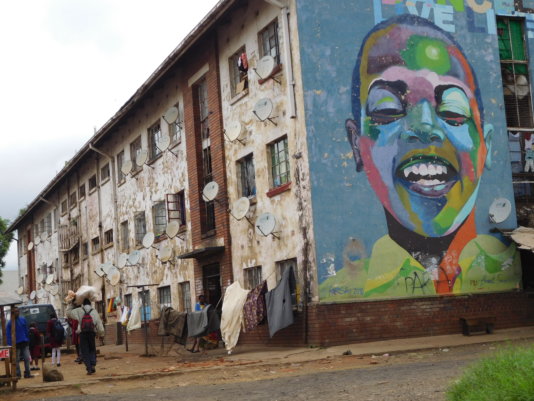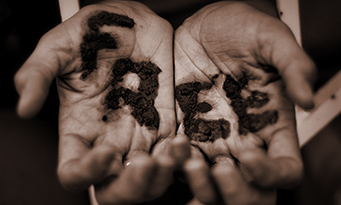- About
- Topics
- Picks
- Audio
- Story
- In-Depth
- Opinion
- News
- Donate
-
Signup for our newsletterOur Editors' Best Picks.Send
Read, Debate: Engage.
| April 01, 2020 | |
|---|---|
| topic: | Poverty |
| tags: | #COVID-19 coronavirus, #human rights, #social distancing |
| located: | Zimbabwe |
| by: | Cyril Zenda |
Hours earlier, President Emmerson Mnangagwa had announced a 21-day lockdown starting on March 30. The lockdown – though not unexpected – caused confusion among the population: how would it be implemented, and why indeed was it necessary?
“They (authorities) may close this market, but it is not a solution,” chimed in 33-year old Question Mashingaidze, another career vendor in the flea market. “I live in Matererini Hostels here in Mbare where I share a room with eight others, so how can we seriously be expected to be stay indoors?”
The blocks of residential flats that Mashingaidze was referring to were originally built for unmarried black urban workers during the colonial times, but are now home to several generations of families.
For tens of thousands of residents of these squalid flats and elsewhere in the country, travelling in crowds is an everyday affair of life from sun-up right to sundown. People have to queue for everything from bare basics as the use of toilets and bathroom facilities to water at few boreholes dotted around, in addition to spending even longer hours in queues for the staple maize meal, which is in critically short supply. The country is in the throes of what the United Nations has described as a man-made starvation. More than half of three million residents of the capital, Harare, have no access to piped water and have to rely on water from communal boreholes and unprotected wells. How can people living such a threadbare existence realistically be put in a lockdown, or be expected to wash their hands on running water for up to 20 seconds, among other precautionary measures recommended by health experts?
It is therefore understandable why communities like these fail to visualise how the lockdown orders – one of the raft of measures put in place to fight this global outbreak – can be complied with.
“Maybe they are saying we should not eat, drink, bathe or do anything for the next three weeks because while this may work in other countries, it cannot work in this part of the world,” said a bemused Gogo Matarise, who vividly remembers restricted life in “protected villages” during the country’s 1970s bush war. “Some thing are better said than done,” added the 80-year old.
This is true in a country where an unemployment rate of more than 90 percent has forced a majority to eke a penurious living in the informal sector.
“How can we have another lockdown in addition to one that we have been having for many years in this country?” asked Raymond Chonai (32), a university graduate who has not worked since graduating more than a decade ago. “Nothing has been working in this country for about two decades... hospitals, schools, water, roads… there are no industries to temporarily close down because they permanently closed down many years ago, nothing is left to put under this new lockdown!”
This high joblessness results in desperate job-seekers and cross-border traders trekking to South Africa – without any documentation – through the porous border, a development that has prompted Africa’s second-biggest economy to moot erecting a 40-km fence to keep these Zimbabweans away.
Karsten Noko a Zimbabwean lawyer and humanitarian working across sub-Saharan Africa said fresh imaginations and alternative solutions would be needed in tackling COVID-19 in Africa.
“Social distancing could probably work in China and in Europe - but in many African countries, it is a privilege only a minority can afford,” Noko said.
“Think of Alexandra in Johannesburg (South Africa), where over 700,000 people are estimated to live in less than five square kilometres (1.9 square miles), Mbare in Harare with some 800,000 people, Kibera in Nairobi (Kenya) with at least 250,000, and Makoko in Lagos (Nigeria) with over 300,000 whose homes are built on stilts in a lagoon.
“Our big cities also pose a conundrum to people who must commute to work. Anyone who has been stuck in a traffic jam in a “matatu” (bus) in Nairobi or in a taxi in Johannesburg – often filled with 12 to 14 people – knows too well that the idea of social distancing on your way to work is a myth.”
While other countries have made huge pay-outs to cushion their citizens from the economic cost of the lockdown, the same cannot be said about Zimbabwe, a country whose government has for several years struggled to even pay its workers, let alone provide basic social services.
“A complete lockdown has been, to an extent, effective in some countries… this is because different governments are offering to pay wages to citizens so that they can continue to afford the basics,” said Freddy Gapukapu. “You cannot lock and restrict a hungry man, this will only lead to greater disturbances across the country.”
Zimbabwe’s could be a worse case but this is the general sentiment, not just in Africa, but also across the wider global south where the harsh realities of social inequalities are complicating the fight against the pandemic.
A recent social media post attributed to an Indian doctor about the class dimension of physical distancing went viral as it appeared to sum up the rock-and-hard-place situation of many in the developing world: “Social distancing is a privilege. It means you live in a house large enough to practise it. Hand washing is a privilege too. It means you have access to running water. Hand sanitizers are a privilege. It means you have money to buy them. Lockdowns are a privilege. It means you can afford to be at home. A disease spread by the rich as they flew around the globe will now kill millions of the poor.”
In spite of the panic that the virus has caused across the world, some – even worse – experiences of the past appear to be turning out to be an oasis of hope in this desert of hopelessness.
“If we survived AIDS, cholera, Ebola, typhoid and everything that has come our way, why should we be worried about this Corona (virus)?” a middle-aged Harare man could be heard yawning aloud while jostling in a long and winding queue leading to a supermarket that had taken delivery of government-subsidised maize meal.
Zimbabwe is one of the nine sub-Sahara African countries that has suffered the full ravages of the HIV/AIDS pandemic. At its peak in Zimbabwe around 2003/4, AIDS-related deaths averaged about 3,800 per week, a trend that lasted for nearly a decade.
In 2008, a cholera outbreak in Zimbabwe killed more than 4 000 people and sickened another 100 000 others, while other epidemics like dysentery and typhoid are a recurrent threat to life.


By copying the embed code below, you agree to adhere to our republishing guidelines.
